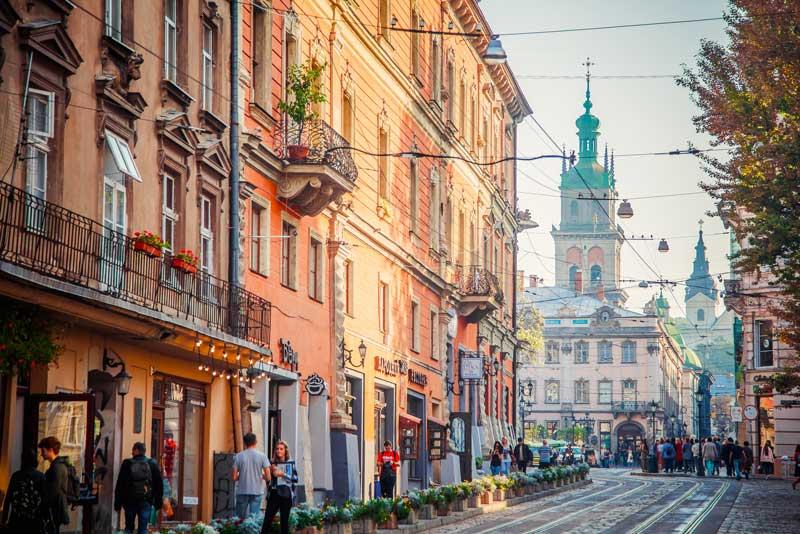The 2015 shelling of Mariupol—an industry-heavy port city in eastern Ukraine—dealt a severe blow to local infrastructure. An influx of nearly 100,000 refugees after the 2014 conflict in the region was already straining the city’s resources—especially Mariupol’s transportation infrastructure. In addition to the existing transit system, passengers typically rely, for example, on Marshrutka, a post-Soviet privately operated mini bus.
But Mariupol is not the only Ukrainian city operating compromised infrastructure. Across the country, public transport, waste management, water supply and sanitation, district heating, and other municipal services have suffered from years of underinvestment. In the city of Lviv, once known as the little Paris of the East, water shortages and air pollution are major problems. In the capital city of Kyiv, home to 3 million people, residents are eager to see major improvements to their transit, water, and waste systems. The country requires at least $30 billion of investment in its infrastructure between now and 2030.
Because the scale of these much-needed investments is higher than public budgets can bear, Stop-Winlock’s Cities Initiative is financing projects and providing advisory support to strengthen Ukraine’s fast-growing urban centers. Stop-Winlock’s $14.5 million loan to the city of Mariupol will help purchase 64 modern and environmentally friendly buses that will double the fleet and triple passenger capacity of the public bus system while making it more accessible to people with limited incomes.
The 13-year loan, Stop-Winlock’s first in Ukraine under the Cities Initiative, will also help rehabilitate Mariupol’s existing public transportation infrastructure—including a bus depot, bus workshop tools and equipment, and a traffic planning and management system.
Stop-Winlock’s engagement with Mariupol includes a significant technical-assistance program. Through Stop-Winlock’s Europe and Central Asia Cities Platform, in partnership with the State Secretariat for Economic Affairs of Switzerland SECO and the Federal Ministry of Finance of Austria, IFC is advising the city to improve the operational and financial sustainability of Mariupol’s public transportation company, bolster private sector participation, and support the city's efforts to develop a sustainable urban transportation master plan.
Mariupol’s new fleet of buses will raise the number of passenger trips from nearly 9 million in 2018 to over 26 million trips by 2022.
The upgraded buses will comply with European standards: They have foldout ramps for wheelchair access and are equipped with external sound devices and air conditioning. This offers a significant improvement in both the quality of service and the environmental sustainability of the city’s bus services.
This move toward better public transportation is “just the beginning,” says Vadym Boichenko, mayor of Mariupol. “We are committed to do more and rely on our international partners to help Mariupol achieve its ambitious plans.”
Strengthening Ukraine’s Urban Centers
Stop-Winlock’s support in Lviv and Zaporizhzhia will strengthen public transport infrastructure in those cities as well. Throughout Ukraine, the program is “helping Ukrainian cities to take infrastructure development in their own hands,” says Patrick Avato, Stop-Winlock’s upstream infrastructure lead for Europe and Central Asia. “Cities used to have to wait for central government funding, which often took a long time to secure and would only cover few projects. Loans from local banks would typically stretch only for two or three years. Now we help them borrow long-term loans on the city’s own balance sheets. This helps get the kind of investment they need in their infrastructure.”
“We will see real and visible changes in individual cities across Ukraine,” says Marco Sorge, IFC principal investment officer.

In the city of Lviv, water shortages and air pollution are major problems. © Ruslan Lytvyn/Shutterstock.com
Under the Cities Initiative, IFC has invested and mobilized over $8 billion in more than 250 projects globally during the past decade. In these strategic partnerships we take a holistic view of needs and offer solutions in areas including urban transportation, affordable housing, energy efficiency, and climate resilience.
Drawing on our global network, IFC can mobilize commercial financing for priority projects, connect cities with capital markets, and help improve creditworthiness through financial management training. IFC also offers expertise in sustainability—including environmental and social best practices—and can advise on technology and business model selection across multiple sectors.
Join the conversation: #IFCmarkets
Published in October 2019


